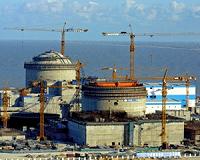 |
Manila (AFP) March 15, 2011 Asian governments that are ramping up nuclear power face huge pressure to curb their programmes in the wake of Japan's atomic crisis, but dozens of reactors will still be built in the near future. In China alone, where 27 nuclear reactors are under construction and 50 more are planned, authorities have said they will push on with their atomic energy efforts despite a potential radiation disaster in Japan. "The plan and determination for developing nuclear power in China will not change," China's vice minister of environmental protection, Zhang Lijun, said at the weekend. Asia has been leading the world's nuclear renaissance in recent years as countries in the region have looked for ways to power their booming economies while lessening their dependency on imported fossil fuels. Of the 62 reactors being built around the world, 40 are in Asia, according to the World Nuclear Association. Aside from China, the association said the major players are India and South Korea, each with five reactors already under construction. South Korea indicated this week it remained determined to pursue its domestic atomic ambitions, and would also press on with efforts to export its technology. "South Korea has the top level of nuclear power plants in terms of safety and efficiency, and they will become a good model in the Middle East," South Korean President Lee Myung-Bak said Monday while in the United Arab Emirates. And authorities in Vietnam, which has plans to put eight nuclear plants into operation over the next 20 years, said they were similarly unfazed. "I don't think the incident in Japan will have any impact on the nuclear power development plans in Vietnam," Vuong Huu Tan, head of the Vietnam Nuclear Energy Institute, told Dow Jones Newswires. Nevertheless the deepening crisis in Japan, where authorities are scrambling to prevent a nuclear meltdown at reactors damaged by last week's catastrophic earthquake and tsunami, will likely curb parts of Asia's historic atomic drive. The Japanese concerns focus mainly on its plant at Fukushima, 250 kilometres (155 miles) northeast of Tokyo, which has begun leaking radiation amid three hydrogen explosions since Saturday. Environment groups have sought to use the Japanese events as proof of the perils of nuclear energy, and governments as well as people in Asia are taking notice, Singapore Institute of International Affairs chairman Simon Tan said. "The scare factor is huge," Tan told AFP. "Everyone regards the Japanese as the most careful people in Asia. If they can't safeguard their reactors, it will certainly spike the safety concerns in the region." Indian Prime Minister Manmohan Singh on Monday ordered safety checks on the country's existing 20 reactors, while China's Zhang said even his country could "learn lessons" from the Japanese crisis. Meanwhile, some countries in the region that are tentatively looking at embarking on an atomic energy programme have indicated the events in Japan are a reason to pause. "Thailand is now studying these matters but what happened in Japan probably affects the decision whether to build nuclear plants in Thailand," Thai Prime Minister Abhisit Vejjajiva told reporters on Sunday. Thailand, which was badly hit by an Indian Ocean tsunami in 2004, has a provisional plan to build five nuclear plants. In neighbouring Malaysia, which is looking to build two nuclear power plants, authorities sought to highlight the fact that it would be at least a decade before the facilities would be built. "We have time to carry out a thorough study, it will take time to conduct such study and the government will not do it secretly without informing the public," Energy, Green Technology and Water Minister Peter Chin Fah Kui said. In Australia, where the Japanese crisis has reinvigorated a long-running debate about embracing nuclear power, Prime Minister Julia Gillard said her ruling Labor Party would not pursue atomic energy. In Bangladesh, which has signed a deal with Russia for two nuclear power plants, authorities said they were monitoring events in Japan closely but that they would pursue their plans. "Our reactors will be third generation and they will be able to withstand even the most powerful earthquake," Bangladesh Atomic Energy Commission chairman Farid Uddin Ahmed told AFP. burs-kma/slb
Share This Article With Planet Earth
Related Links Nuclear Power News - Nuclear Science, Nuclear Technology Powering The World in the 21st Century at Energy-Daily.com
 Japan quake setback to global nuclear industry
Japan quake setback to global nuclear industryWashington (AFP) March 14, 2011 The meltdown and radiation fears at Japan's nuclear power plants following a massive earthquake put nuclear power supporters on the defensive Monday just as the industry was enjoying a renaissance. Opponents raised new doubts about the safety of nuclear plants advertised as "clean" energy, and investors dumped the shares of companies that manufacture or operate nuclear plants. Supporters ... read more |
|
| The content herein, unless otherwise known to be public domain, are Copyright 1995-2010 - SpaceDaily. AFP and UPI Wire Stories are copyright Agence France-Presse and United Press International. ESA Portal Reports are copyright European Space Agency. All NASA sourced material is public domain. Additional copyrights may apply in whole or part to other bona fide parties. Advertising does not imply endorsement,agreement or approval of any opinions, statements or information provided by SpaceDaily on any Web page published or hosted by SpaceDaily. Privacy Statement |